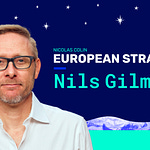The Agenda 👇
I spoke with Emily de La Bruyère about industrial policy in China—and how it’s a challenge for the West 🎧
My Sifted column this week is about Tiger Global and the many deals they’re doing in Europe these days
Thumbs up/down for last week, as well as recent news.
I first discovered Emily de La Bruyère, a US-based analyst focused on industrial policy in China, through Jordan Schneider’s ChinaTalk podcast. What she had to share was so enlightening I even dedicated an entire edition to it, Industrial Policy: China Gets It, We Don't (now accessible for all).
The key idea that stood out in Emily and Jordan’s conversation was the following:
What matters today is the applications of science and technology––the sort of networks you build with it.
For example, your ability to deploy telecommunications. It’s not that you got the patent; it’s that you’ve got its application internationally.
To do that, what matters is capturing scale and being able to build and deploy. If that’s what you’re going for, it’s okay to have a slight lag in when you get the patent and when you get the really cutting edge, as long as you can apply it to scale to the most people efficiently.
The Chinese orientation appears to be focusing on that rather than on basic R&D, which creates this tremendous asymmetry vis-à-vis the U.S. and really vis-à-vis the entire global system because there’s just a different competition underway.
And that absolutely changes how the U.S. can or should respond to the extent that this is a scientific and technological contest because it’s not a matter of just pouring resources into basic research: it’s about competing for applications.
Emily and I are following up on that in this new episode of the Building Bridges podcast. I was especially interested in her idea that the current industrial competition between nation states at the global level is happening in two dimensions:
One is about securing control of essential resources, especially energy sources, which fosters a traditional zero-sum competition from a geopolitical perspective.
But then there’s another dimension, which is about controlling networks and the data that flows through them—which gives rise to a very different kind of competition globally.
I find that there’s no better lens to understand the current rivalry between the US and China in the tech space and beyond. In addition to these, Emily and I discuss the following points:
How she ended up focusing on industrial policy in China, and what it’s like to study China from a distance, all based on open source material.
Why international standards matter from an industrial policy perspective, and why it’s about much more than a spy game between great powers.
What advice Emily would give if she joined the Biden administration to advise the US President on America’s competitiveness on the global stage.
Why the West remains a thing, and why the US is better off counting on Europe as a strong ally as networks and data redraw the global map of power.
Why we shouldn't rely on a Cold War framework when reflecting on the state of the world, and why all of this matters for entrepreneurs building companies on the ground in Europe.
👉 Listen to my conversation with Emily de La Bruyère in the latest episode of the Building Bridges podcast using the player above 👆 or on Apple Podcasts or Spotify.
⚠️ My column today in Sifted asks a few million (billion?) dollar questions: How is hedge fund Tiger Global’s blazing arrival on the EU tech scene going, and what will happen to the companies it’s investing in when today’s macroeconomic context of enormous amounts of capital reverses?
It’s a fascinating example of how venture capital is being upended by the arrival of major players from other financial realms. I’m very curious to see how VCs that are active in Europe, especially tier-1 firms, react to this kind of unconventional investor, both now and in the future.
👉 Read it all in Tiger Global: What happens when ‘normal’ returns? 📈📉
😀 Nathan Benaich of Air Street Capital is at it again! After an op-ed in the FT about European universities’ bad practices when it comes to spinning out startups (which in turn prompted my own Sifted column on the topic), he just shared the longer, more detailed version on his firm’s blog:


Related: Bessemer Ventures’s Gaby Goldberg’s thoughts about Stanford University and its relationship with the VC industry: After a decade of VC influence at Stanford, what’s next?
🙂 About that, an account of my previous writing on deep tech startups, a common friend recently introduced me to Massimo Portincaso, the chairman of Hello Tomorrow and a co-author of this recent report: The Deep Tech Investment Paradox: a call to redesign the investor model (highly recommend).
😏 My colleagues at The Family and I have long been convinced that European founders should focus on ‘hybrid’ startups bringing technology to traditional industries. Well, Roy Bahat and James Cham of Bloomberg Beta came up with a name for exactly that: “hot-swap startups”.
😐 Cryptos: there are booms, and then there are busts. But beyond that, as I’ve argued many times in the past, there’s a dynamic that’s bringing about many innovations when it comes to network protocols, software architecture, and the financial system. My colleague Younès Rharbaoui, CFO at The Family, wrote about the implications in the realm of corporate finance: The DeFi Frontier.
😒 Corporate venture capital is a tough nut to crack, between the conflicting goals and the bad practices when it comes to leading investments and rewarding those who are in charge. Here are some nuances in Institutional Investor: Families Make Corporate VC Investments Better, Research Shows.
Related: Check out this article about tech companies such as Stripe, Netflix, and Carta setting up their own CVC funds: Complements and Constraints.
😖 Trump did a lot of bad things, and some of the things he broke may be beyond repair. But a positive aspect of his legacy is his ability to inspire engagement on the liberal side, be it on climate change, racial justice, or building liberal institutions in general (via Byrne Hobart): 2016: The Turning Point.
😴 I didn’t contribute to The Family’s daily newsletter this week, but make sure to check out my colleagues’ posts: Employee-friendly fundraising (by Balthazar de Lavergne) and 399 ideas that didn't work (by Oussama Ammar).
🇫🇷 Nouveau Départ (in 🇫🇷): yesterday’s edition was on Warren Buffett : une introduction🤑 and last Thursday’s was on Écriture : nos histoires & nos conseils📝 Also give a listen to Laetitia’s conversation with Fabienne Broucaret: Télétravail : le bon environnement💻.
From Industrial Policy: China Gets It, We Don't (October 2020):
I don’t think you can understand China’s industrial policy if you don’t realize that it’s all pulled forward by the impressive growth of the Chinese tech giants. First, you need the downstream companies discovering new models and new usages and exploring new markets; then you can invest up the stream so as to ensure your nation’s competitive advantage in cutting-edge technology.
This doesn’t necessarily have to be consumer-facing companies. Back in the 1960s in the US, it was the military and the goal was to prevail over the Soviet Union. More recently, in the case of Huawei in China, we’re talking about a company that needs technological assets to deploy telecommunication networks rather than serving consumers. But whatever it is (public or private, consumer or enterprise), you need that direction provided from down the stream.
Sign up to European Straits if you don’t want to miss the next issues 🤗
(Credit: Franz Liszt, Angelus ! Prière Aux Anges Gardiens—extrait du disque Miroirs de Jonas Vitaud, NoMadMusic.)
From Normandy, France 🇫🇷
Nicolas





















China’s Industry Policy w/ Emily de La Bruyère. Tiger Global in Europe.